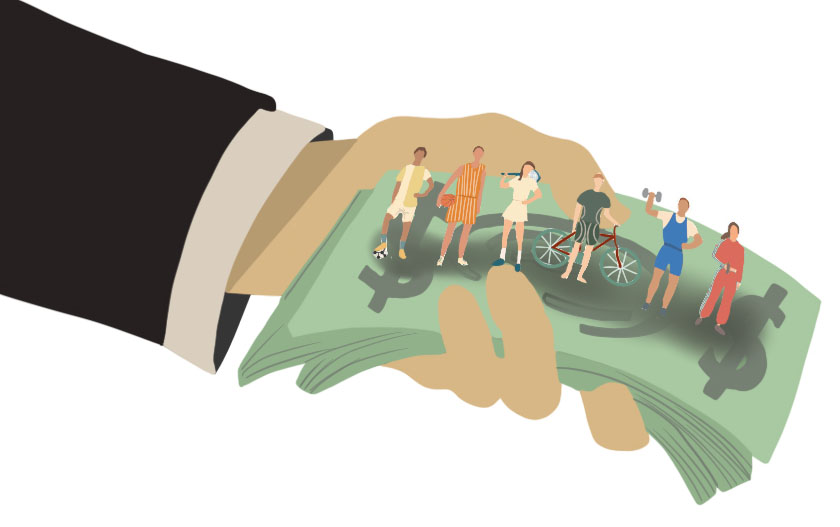Cash is king
Events over the past couple of years have illustrated that despite advancements elsewhere in our culture about personal wellbeing, sports continue to be governed by the almighty dollar.
April 12, 2022
Formula One is an objectively dangerous sport. Drivers are strapped in their cars as they speed along the track at rates of 200 plus miles per hour, but during the Saudi Arabian Grand Prix at the Jeddah Corniche Circuit, drivers faced an even bigger danger off-track. During free practice on March 25, the first day of the race weekend, driver Max Verstappen radioed to his engineer, “I can smell burning … is it my car?” as he assumed a malfunction occurred with his vehicle. As it turns out, the danger was not in his car, but less than 10 miles away where a massive explosion occurred. A fire broke out at Aramco oil depot due to a missile attack launched by Houthi rebels. Smoke lingered over the track, as did a shadow that hung over the race weekend.
That night, a four-hour meeting ensued. Executives, team bosses and Saudi Arabian officials discussed the safety of the proceedings until 2:30 a.m. In the end, the controversial race proceeded as planned, but the topic of safety — not only for the drivers but for all of the staff — was brought to light.
When the first wave of COVID-19 hit and health was brought into question, driver Lewis Hamilton dubbed the term “Cash is King” in response to the questions around why the sport would continue during a health crisis. But Formula One is not the only sport that experiences this “Cash is King” mentality. It seems that many sports organizations are more concerned with money than they are with the well-being of athletes who compete.
In particular, athletes’ mental health has faced scrutiny over the barricades of different sports. Tennis player Naomi Osaka withdrew from the 2021 French Open after she was fined and threatened with suspension for her decision against partaking in media interviews to prioritize her mental health. After a loss, these post-match media interviews often default to a barrage of negative comments, dragging athletes down after they have already faced defeat. They are seated at a table in front of a plethora of sponsors with a conspicuously placed bottle of water with its name-brand label clearly distinguishable. It’s no doubt the French Tennis Federation so desperately wants players to be present at these interrogations — no matter the effect it has on their well-being. After Osaka’s decision to prioritize her mental health, gymnast Simone Biles followed in a similar fashion as she withdrew from the team competition at the 2021 Tokyo Summer Olympics due to her mental health; moreover, showing that emotional welfare is a predominant problem in the sports world that should be taken seriously by audiences and sports organizations alike.
It’s completely understandable that these organizations seek to make a profit, but at a certain point, shouldn’t the athletes who train their whole lives to compete in these high-level sports hold more power than capitalistic greed? Too often, the health and safety of athletes is a much lower priority.
Even in the most competitive, top levels of sport, these governing bodies should not have the authority to endanger athletes all in the name of profit. Ultimately, athletes should have more of a say in their profession, how competitions are run and how they should be treated. It seems strange that currently even the top players in their respective fields only have limited power in changing the way that their sport operates. Hamilton is a seven-time world champion in Formula One and one of the most influential drivers on the grid, but his opposition to the race in Saudi Arabia made little impact in the proceeding of the event. Osaka is a four-time Grand Slam winner, but even she faced repercussions for taking a stand for her mental health. Even those who should seemingly have the influence to promote change have little power to do so. More jurisdiction should be placed in athletes’ hands in order to make their respective sports safer and more enjoyable.
Even if their job is on a field or in a gymnasium, athletes, just like any other worker in any other industry, should be granted a safe and healthy work environment. Mentally and physically, they should not be pressured to put themselves into unstable conditions for the sake of the sponsors or in the name of the sport’s governing bodies who could not care less about the people who they put in peril.
In the end, it’s important that athletes are treated as people and they should have a safe environment when competing. The current state of sporting organizations is like a game of chess, and when cash is king and athletes are treated as pawns, it is athletes who seem to face the most harm.













